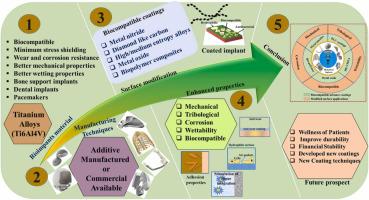当前位置:
X-MOL 学术
›
J. Alloys Compd.
›
论文详情
Our official English website, www.x-mol.net, welcomes your feedback! (Note: you will need to create a separate account there.)
Surface modification of Ti6Al4V alloy via advanced coatings: Mechanical, tribological, corrosion, wetting, and biocompatibility studies
Journal of Alloys and Compounds ( IF 6.2 ) Pub Date : 2024-04-06 , DOI: 10.1016/j.jallcom.2024.174418 Ankit Kumar , Gurminder Singh
Journal of Alloys and Compounds ( IF 6.2 ) Pub Date : 2024-04-06 , DOI: 10.1016/j.jallcom.2024.174418 Ankit Kumar , Gurminder Singh

|
Titanium alloys play a prominent role as metallic biomaterials in the biomedical sector, particularly for implant applications. Various types of Ti alloys are suitable for medical treatment, including Ti6Al4V (Ti64) alloys, which are extensively utilized in biomedical implant materials. This preference was attributed to their commendable strength, excellent corrosion and wear resistance, and satisfactory biocompatibility. Nonetheless, implants produced through diverse additive manufacturing (AM) methods or commercially available methods face performance-related challenges, including mechanical, wear resistance, corrosion resistance, wettability, and biocompatibility. To address these limitations, researchers have actively sought ways to enhance the implant performance. An effective approach to overcoming these challenges involves surface modification using advanced coatings. Therefore, this work provides a comprehensive review of various surface coating materials and techniques employed to enhance the mechanical properties, wear resistance, corrosion resistance, wettability, and biocompatibility of titanium alloys for biomedical applications. This review encompasses an array of coating materials, including metal nitrides (MNs), diamond-like carbon (DLC), high-entropy alloys (HEA), metal oxides (MO), and polymer–metal oxide (P-MO) composites. It offers detailed insights into the operational bio-mechanisms of various coatings, thoroughly discusses how and which type of coatings enhance biocompatibility, and provides valuable insights for advancing the field.
中文翻译:

通过先进涂层对 Ti6Al4V 合金进行表面改性:机械、摩擦学、腐蚀、润湿和生物相容性研究
钛合金作为金属生物材料在生物医学领域发挥着重要作用,特别是在植入应用中。各种类型的钛合金都适用于医疗,其中Ti6Al4V(Ti64)合金广泛应用于生物医学植入材料。这种偏爱归因于它们值得称赞的强度、优异的耐腐蚀性和耐磨性以及令人满意的生物相容性。尽管如此,通过各种增材制造 (AM) 方法或商用方法生产的植入物面临着性能相关的挑战,包括机械、耐磨性、耐腐蚀性、润湿性和生物相容性。为了解决这些限制,研究人员积极寻找提高植入物性能的方法。克服这些挑战的有效方法是使用先进涂层进行表面改性。因此,这项工作对用于增强生物医学应用钛合金的机械性能、耐磨性、耐腐蚀性、润湿性和生物相容性的各种表面涂层材料和技术进行了全面综述。本综述涵盖了一系列涂层材料,包括金属氮化物(MN)、类金刚石碳(DLC)、高熵合金(HEA)、金属氧化物(MO)和聚合物-金属氧化物(P-MO)复合材料。它提供了对各种涂层的操作生物机制的详细见解,深入讨论了如何以及哪种类型的涂层增强生物相容性,并为推进该领域提供了宝贵的见解。
更新日期:2024-04-06
中文翻译:

通过先进涂层对 Ti6Al4V 合金进行表面改性:机械、摩擦学、腐蚀、润湿和生物相容性研究
钛合金作为金属生物材料在生物医学领域发挥着重要作用,特别是在植入应用中。各种类型的钛合金都适用于医疗,其中Ti6Al4V(Ti64)合金广泛应用于生物医学植入材料。这种偏爱归因于它们值得称赞的强度、优异的耐腐蚀性和耐磨性以及令人满意的生物相容性。尽管如此,通过各种增材制造 (AM) 方法或商用方法生产的植入物面临着性能相关的挑战,包括机械、耐磨性、耐腐蚀性、润湿性和生物相容性。为了解决这些限制,研究人员积极寻找提高植入物性能的方法。克服这些挑战的有效方法是使用先进涂层进行表面改性。因此,这项工作对用于增强生物医学应用钛合金的机械性能、耐磨性、耐腐蚀性、润湿性和生物相容性的各种表面涂层材料和技术进行了全面综述。本综述涵盖了一系列涂层材料,包括金属氮化物(MN)、类金刚石碳(DLC)、高熵合金(HEA)、金属氧化物(MO)和聚合物-金属氧化物(P-MO)复合材料。它提供了对各种涂层的操作生物机制的详细见解,深入讨论了如何以及哪种类型的涂层增强生物相容性,并为推进该领域提供了宝贵的见解。



























 京公网安备 11010802027423号
京公网安备 11010802027423号